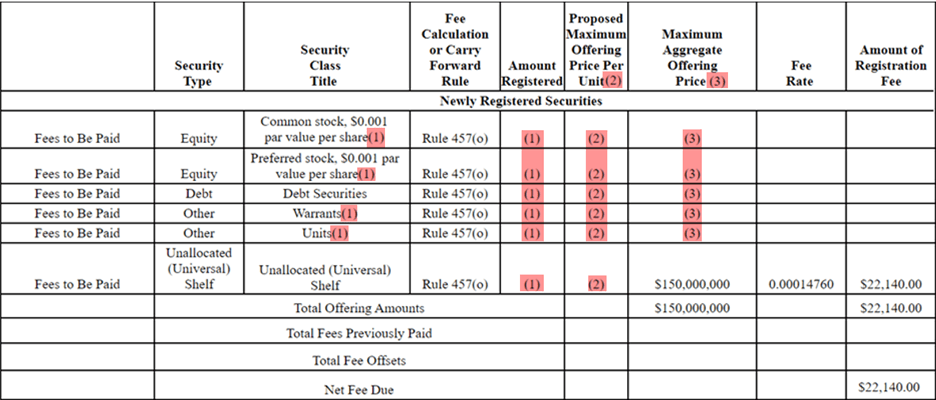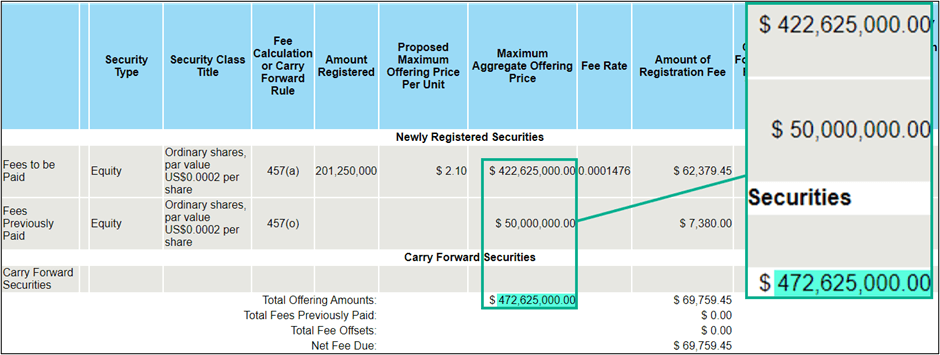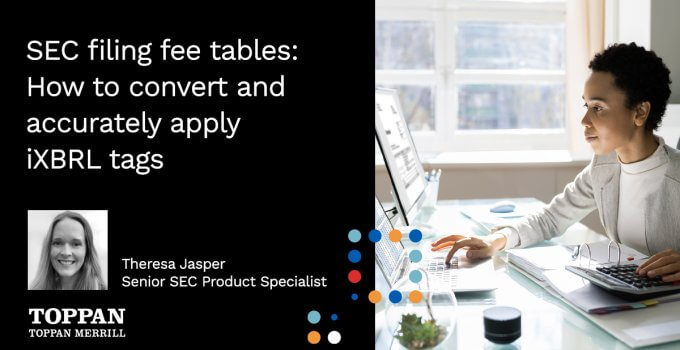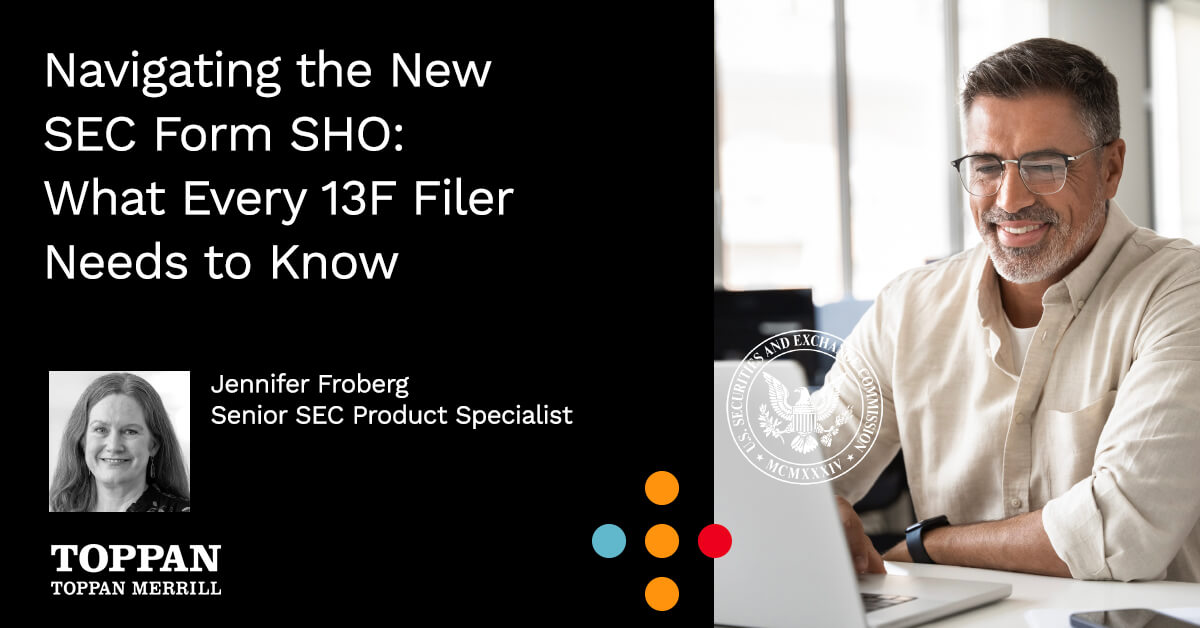Originally posted June 5, 2024. Updated July 2, 2025.
In a previous blog post, we outlined the initial phases of the SEC’s Filing Fees and Payment Method Modernization final rule. The mandate changed how filing fees in registration statements, fee bearing proxies and tender offers were disclosed and disseminated. While the new fee table layout launched on Jan. 31, 2022, we still see instances of fee tables that do not match the specific instructions presented in the final rule or provided in the SEC Forms.
During this initial phase, filers had the option to construct fee tables in HTML without following the explicit instructions of the rules and form instructions.
Beginning July 31, 2024, large accelerated filers were required to submit the fee data in Inline XBRL (iXBRL) format, with all other filers phased in beginning July 31, 2025. Once filers are mandated to file with iXBRL tagging, the layout and requirements for the fee tables must be followed in order for the filing to be accepted by EDGAR.
Below are several areas to be aware of to ensure your draft fee tables can be converted and tagged efficiently, along with areas that will no longer be editable in the structured data format (iXBRL).
Table 1: Newly Registered and Carry Forward Securities
Footnote References
Currently: Footnote references are allowed in any table cell or table head in HTML format.
In iXBRL format:
- A single footnote reference is allowed per listed security, excluding nested Unallocated (Universal) Shelf, listed within the table.
- Footnote references are not allowed in column heads or within the ‘totals’ cell(s).
- The same footnote cannot be referenced on multiple rows.
Filers will need to recraft their footnotes to account for these EDGAR technical limitations. Each footnote will allow for a maximum of 10,000 characters. See the SEC’s Filing Fee Interface Guide, beginning on page 30, for more information.
Filed example

Converted example

Pre-effective amendment increase
The ‘Total Offering Amounts’ will be a total of all amounts listed in the ‘Maximum Aggregate Offering Price’ column (including Fees to Be Paid and Fees Previously Paid lines) and this total cannot be edited.

Proposed Maximum Offering Price Per Unit
The value must be in US Dollars and cannot be a percentage. We often see filed examples with a value of 100% or other percentages (i.e., 95%). Filers must determine the replacement value when using rule 457(a).
Filed example

Screenshot from FEPT

Table 2: Fee Offset Claims and Sources
Each Fee Offset Claim line must be followed by at least one Fee Offset Source line. The offset information may be to the same filing. However, in cases where the Fee Offset Claim did not deduct fees (i.e., the fees were covered by an offset), the Fee Offset Source will include filing information that is the source of the fee offset claimed (i.e., the filing where fees were deducted from the account).

Form or Filing Type
This field, in both the Fee Offset Claims and Fee Offset Sources lines, must refer to the ‘base’ form type. For example, when offsetting to an S-3/A submission, the Form type listed in this field must be S-3.

Fee Table Worksheets
Below you will find links to the current fee table worksheets:
- Registration Statements and Prospectus Filings
- Form S-8
- Tender Offers
- Form F-10 and Form N-14
- Proxy
- Form SF-1 (ABS Registration – iXBRL tagging optional)
- Final Prospectus (Narrative Only)
Additional items of note
- A Euro symbol is not allowed anywhere in the table or footnotes.
- Rule 457(c) is not an option in the Fee Rule column. The SEC provides guidance for filers to refer to rule 457(a) in place of rule 457(c) in their EDGAR Filing Fee Modernization Topics of Frequent Inquiry article.
- The name of the filer in Fee Table 2 ‘Fee Offset Source’ must be the current name of the CIK.
- If the name of the filer updated since the filing being offset was filed, the current new name must be listed.
- The Fee Rate must be listed in decimal format.
- The Form Type listed above Fee Table 1 is the base form type. It is not the submission type. For example, a submission type 424B2 filed after an S-3ASR, will list the base form type of S-3.
iXBRL fee data tagging phase-in schedule
The SEC updated the EDGAR system to allow for early testing and voluntary filing of iXBRL tagged fee data. The iXBRL phase-in dates are:
- Large accelerated filers beginning July 31, 2024.
- All other filers beginning July 31, 2025.
Note: iXBRL tagging of filing fees will cover companies registering securities on any applicable filing, including IPOs.
Access Expert Support
For 55+ years, the dedicated SEC reporting experts at Toppan Merrill have supported issuers navigating the regulatory disclosure and filing process. Connect with one of our experts at [email protected] or by calling 800.688.4400.
Disclaimer
The examples provided in this blog were created using the SEC’s Fee Exhibit Preparation Tool (“FEPT”) to ensure successful validation of content and requirements.
Please note that the SEC filing fee rate has changed since the creation of the images and videos included in this blog post. Be sure to reference the current fee rate when preparing your filings to ensure accuracy.



